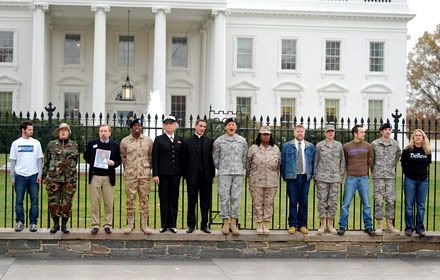
Lt. Dan Choi is currently on trial, over a civil disobedience arrest made in front of the white House on November 15, 2010. Psychodrew wrote about it yesterday here, including some distrubing revelations that the Secret Service somehow had knowledge of the action long before it was made public.
Now breaking from Metro Weekly:
The third day of the U.S. government's trial of former Lt. Dan Choi ended with a 10-day delay for the government to seek an order from a higher court stopping the decision made today by U.S. Magistrate Judge John Facciola to allow Choi's lawyers to argue the government singled out Choi for "vindictive prosecution."
Facciola said this morning that he had found there was prima facie evidence for "vindictive prosecution," meaning enough evidence was presented to allow Choi's lawyers to pursue such a claim. As a result, Choi's lawyers would be able to ask for more documents and evidence from the government in order to investigate if higher-level officials advised their subordinates to try Choi in federal court rather than district court.
Choi's Attorney, Robert Feldman declared the finding a "huge victory for gay rights."

To call its effect on the larger gay rights "huge" might be a bit of hyperbole—or at least premature, they are framing this case as a Shuttlesworth redux. But it is a big victory for Choi, and a serious setback to the prosecution. His defense team has announced their intention to subpoena Department of Interior Solicitor Randolph Myers to explain the email he sent to Parks Police. Myers counseled the Parks police on what charges to file three hours before the demonstration had begun, or before any word of it was known to the public. A "vindictive prosecution" defense will buttress the defense's ability to subpoena such higher-level officials. The court might ask Myers and Secret Service to explain how they came to know a protest was imminent on the morning of November 15th?
The US Attorney Angela George is currently seeking a writ of mandamus (or a writ of prohibition) against the judge — seeking to stop the pursuit of the "vindictive prosecution" defense, and the trial has broken. Ms. George might not have impressed the Judge that the DOJ was not being vindictive when she had to be ordered by the court to address Choi and witness James Pietrangelo as "Lieutenant" and "Captain" respectively, not as "Mister."
Tempers flared when Feldman and George sparred over [US Attorney, Angela] George’s refusal to call Choi and Pietrangelo by their ranks, referring to them as “Mister” because “they are not in the military anymore.” Magistrate Judge John Facciola resolved the issue by ordering George to address them by their highest achieved ranks.
A good way to demonstrate your office is not being vindictive, is to not to behave in petty, vindictive ways.
Updated to include an explanation of the "vindictive prosecution" guidelines from the Department of Justice, via Metro Weekly:
A Department of Justice memorandum from its procedure manual for DOJ attorneys describes the standard in court "to establish a prima facie case of vindictive prosecution," stating, "[A] defendant must make a 'showing that charges of increased severity were filed because the accused exercised a statutory, procedural, or constitutional right in circumstances that give rise to an appearance of vindictiveness.'"
Update: More details from the today's trial from John Riley just went up at Metro Weekly:
Earlier this morning, in his second time on the stand, U.S. Park Police Lt. Robert LaChance testified he had received an e-mail from the Secret Service about the November 2010 protest that led to Choi's arrest. U.S. Park Police Capt. Phil Beck, another witness called by the defense, said that normally Secret Service does not get involved with protests in front of the White House.
After the Judge ruled Choi's defense was admissable George asked for a recess to confer with her superiors at the DOJ.
George and her assistant were joined by multiple DOJ employees, who sat in the viewing area, whispering among themselves. George then engaged in a back-and-forth with Judge Facciola and Choi's defense lawyers over whether the defense of selective prosecution, or "vindictive prosecution" should have been raised before the trial. The government previously filed a motion on Aug. 28 to limit the scope of subject matter in Choi's trial, meaning he would not be able to talk about "Don't Ask, Don't Tell," and to prevent Choi's lawyers from adopting the defenses of selective prosecution or impossibility.
Facciola said that, while that would be true in a jury trial, he was wearing "two different hats," one looking at the evidence as if a juror, and the other looking to see that the defendant's constitutional rights were not violated. When asked by George what his intentions were, he said he was insulted by the question and refused to answer it.
That Judge is sure being charmed by the US Attorney. I'm sure he enjoys the idea that they are running to a higher court calling him incompetent as well. I'm sure that would make any magistrate's day.
Choi's attorney objected to the break in the trial, saying it was an obstruction of his right to a speedy trial. George and the DOJ spokesperson declined comment for the Metro Weekly reporter.


